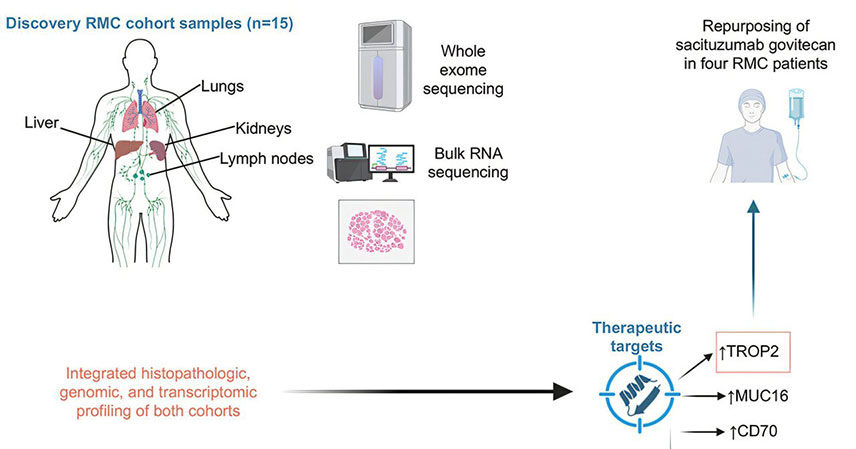Renal Medullary Carcinoma (RMC) stands as one of the most aggressive and challenging forms of kidney cancer. This rare disease disproportionately affects young adults, particularly those with sickle cell trait. For too long, treatment options have been severely limited, leading to a grim prognosis for many patients. However, a significant ray of hope has emerged from the collaborative efforts of leading cancer research institutions.
Researchers at The University of Texas MD Anderson Cancer Center, in conjunction with BostonGene, have recently published findings from the largest and most comprehensive molecular analysis of RMC to date. Their groundbreaking work has led to the identification of TROP2 as a promising new therapeutic target. This discovery could potentially revolutionize how this devastating cancer is approached and treated.
The landscape of cancer research is constantly evolving. Advances in molecular analysis are opening doors to previously intractable diseases. This latest research into RMC exemplifies this progress. It offers a much-needed beacon of hope for a patient population with very few alternatives.
Understanding Renal Medullary Carcinoma (RMC) 🧬
RMC is an exceptionally rare and aggressive kidney cancer. It is often diagnosed at an advanced stage. This makes effective treatment even more difficult. The disease is strongly associated with sickle cell trait, a genetic condition affecting red blood cells. While many individuals with sickle cell trait lead healthy lives, a small subset can develop RMC.
Historically, the prognosis for RMC patients has been poor. Standard chemotherapy regimens have shown limited efficacy. This highlights the urgent need for novel therapeutic strategies. The aggressive nature of RMC means that tumors often grow rapidly. They can also spread quickly to other parts of the body. This rapid progression underscores the importance of early and effective intervention.
Understanding the unique molecular characteristics of RMC is crucial. This understanding can pave the way for more targeted and effective treatments. Prior to this study, detailed molecular profiles of RMC were scarce. This lack of data hindered the development of specific therapies.
The Breakthrough: TROP2 as a Therapeutic Target ✨
The collaboration between MD Anderson Cancer Center and BostonGene represents a pivotal moment. Their extensive molecular analysis delved deep into the genetic and protein profiles of RMC tumors. This meticulous investigation allowed them to uncover critical vulnerabilities within the cancer cells. The sheer scale of this analysis makes it unprecedented for RMC.
The most significant finding was the identification of TROP2 as a promising therapeutic target. TROP2, or Trop-2, is a cell surface glycoprotein. It is known to be overexpressed in several types of cancer. Its presence on RMC cells suggests a potential pathway for targeted drug delivery. This means therapies could be designed to specifically attack RMC cells while sparing healthy tissue.
Researchers identified TROP2 through comprehensive genomic and proteomic profiling. They analyzed tumor samples from numerous RMC patients. This allowed for a robust and statistically significant identification of TROP2’s prevalence. The discovery of such a specific target is a game-changer. It shifts the paradigm from broad-spectrum treatments to precision medicine for RMC.
Targeting TROP2 has already shown promise in other cancer types. This existing knowledge provides a strong foundation. It accelerates the potential development of RMC-specific treatments. The research team meticulously validated their findings. They used multiple molecular techniques to confirm TROP2’s expression in RMC tumors. This rigorous approach strengthens the credibility of their discovery.
Implications for Treatment and Future Directions 💡
The identification of TROP2 opens up exciting new avenues for treatment development. One potential strategy involves the use of antibody-drug conjugates (ADCs). These are innovative therapies. They consist of an antibody linked to a potent chemotherapy drug. The antibody specifically targets TROP2-expressing cancer cells. This delivers the drug directly to the tumor. This approach minimizes systemic toxicity. It also maximizes therapeutic efficacy.
While this discovery is incredibly promising, it is important to maintain a cautious perspective. The research has identified a target. It has not yet produced a cure. Further research and clinical trials are essential. These trials will evaluate the safety and effectiveness of TROP2-targeted therapies in RMC patients. This process takes time and significant resources.
This breakthrough also highlights the power of collaborative research. Combining the clinical expertise of MD Anderson with BostonGene’s advanced molecular analysis capabilities was key. Such partnerships are vital for tackling rare and complex diseases. They accelerate the pace of scientific discovery. They bring hope to patient communities.
Ultimately, this research could lead to improved outcomes for RMC patients. It offers a tangible pathway toward more effective and less toxic treatments. The hope is that TROP2-targeted therapies could provide a much-needed lifeline. This could transform the lives of those affected by this aggressive cancer. It marks a significant step forward in the fight against RMC.
Key Insights from the RMC Research 📈
- The largest molecular analysis of Renal Medullary Carcinoma (RMC) has been successfully completed.
- TROP2 has been identified as a highly promising therapeutic target for RMC.
- This discovery paves the way for the development of new, targeted therapies, such as antibody-drug conjugates.
- The research offers significant hope for improving treatment outcomes for patients with this rare and aggressive kidney cancer.
- Collaborative efforts between leading institutions are crucial for advancing rare cancer research and developing precision medicine approaches.
The journey from a promising target to an approved therapy is long. However, this study provides a crucial first step. It illuminates a path forward for RMC. Patients and clinicians now have a reason for increased optimism. This research underscores the ongoing commitment to understanding and conquering even the rarest cancers. It is a testament to the power of dedicated scientific inquiry.
Source: Molecular profiling of renal medullary carcinoma identifies TROP2 as a promising therapeutic target



